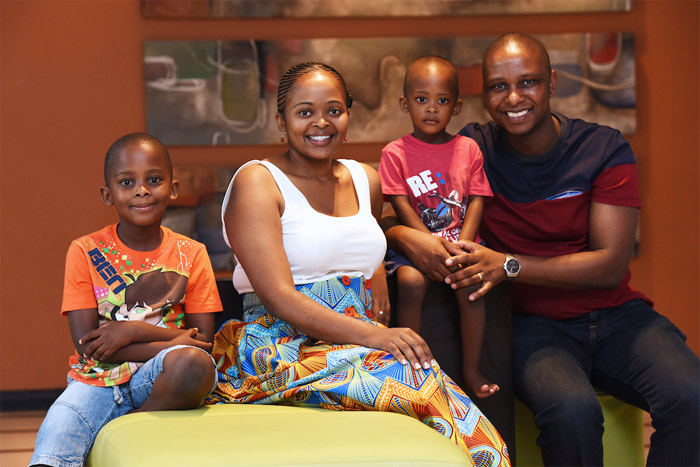PhD highlights 'unintended consequences' of academic development

Chemical engineer Dr Disa Mogashana graduated with a PhD in engineering education on 19 December 2015. Her research looked at how students negotiate their way through the academic development programme.

Family support: Dr Disa Mogashana says her family were behind her every step of the way. Pictured with her, from left, are her sons Rese (6), Tumiso (2) and husband Lucky. "My husband has been nothing else but a blessing. He's been supportive throughout," says Disa.
Dr Disa Mogashana set out to answer a question about success: Why was it that some students succeeded and others not?
"When you look at research into students from previously disadvantaged backgrounds, mostly it looks at deficits: What is lacking; why are they failing; what can we do about them? I wanted to find out from those who are succeeding: How is it they are making their way?" she explains.
To answer this question, Mogashana interviewed 12 students three times during the course of their fourth year of UCT's five-year Academic Support Programme for Engineering (ASPECT).
What she uncovered, however, wasn't quite what she'd expected. Mogashana is herself a product of the ASPECT programme, having come to study chemical engineering at UCT from Thaba Nchu in the Free State in 2001. After completing her degree in 2005, she did a masters in engineering education which landed her a lecturing job in the ASPECT programme. Then, in 2010, she decided to take the next step in her career and enrolled for a PhD.
However, she hadn't counted on a number of imminent changes in her personal life, not least a family move to Johannesburg where her husband Lucky Mogashana, also a UCT graduate in chemical engineering, had landed a job. Thus, she found herself in Joburg with a toddler and another baby on the way, and tackling her PhD at UCT from a distance. "I still don't know how I did it," she says.
Harrowing stories
For her PhD, Mogashana picked students who had managed to make it through to fourth year without exclusion, the greatest risk facing students enrolled in the ASPECT programme.
Some had harrowing stories of personal hardship, like the student who slept rough in the summer house at UCT during a summer term because he had no money for accommodation.
Or the student from Limpopo who arrived at UCT thinking he had a space in residence only to find it had been given away because he was unaware that he had needed to confirm in advance. Without any family, money or anywhere to stay, it took a week before he and another student in the same predicament managed to secure a spot in an old store room.
But aside from these stories of hardship, related to accommodation and financial constraints, there was also the matter of what Mogashana calls "unintended consequences" of the academic development programe (ADP) which led to feelings of marginalisation on the part of the students.
"With regard to culture, it was found that the prevalent ideas about ADP students underscored their experiences of marginalisation and exception," she found. Because of historical circumstances, by default most of the students were black and therefore they felt there was some racial element to their being on the programme.
"They internalise this issue. As a result, some end up falling out believing this is not the institution for them," she explains.
In addition, the students were having to play catch up all the time. Among the problems identified was the fact that the course was designed around the mainstream, which meant those on the ADP had to contend with a fragmented curriculum, shortened exam periods and unfavourable exam timetables (which saw one student having to write three exams in two days).
Way forward
But what of the success behind these students? This derived from how these students viewed themselves in relation to their circumstances.
"Regardless of how tough things were, some of us look at ourselves and say we'll make it. We all have that in common as human beings," she says. Her thesis describes the students as having "exercised corporate agency and different modes of reflexivity to overcome some of their constraining circumstances".
It concludes that while ADP has facilitated entry into university for students, it also "exacerbated their experiences of exception". As for the way forward, she suggests that work needs to be done on transforming the curriculum to make it more inclusive.
"What I see happening is what engineering has started to do. They no longer take in a separate cohort of students but rather track their progress after the first term to see who needs help."
She plans to use her PhD research, together with life coaching, to help individuals make their way and to overcome personal obstacles. She is also keen to return to teaching chemical engineering.
And, she has another objective: To revisit the cohort of students she interviewed for her PhD in a few years' time to see how they are making their way in the world.
Story by Andrea Weiss. Photo by Michael Hammond.